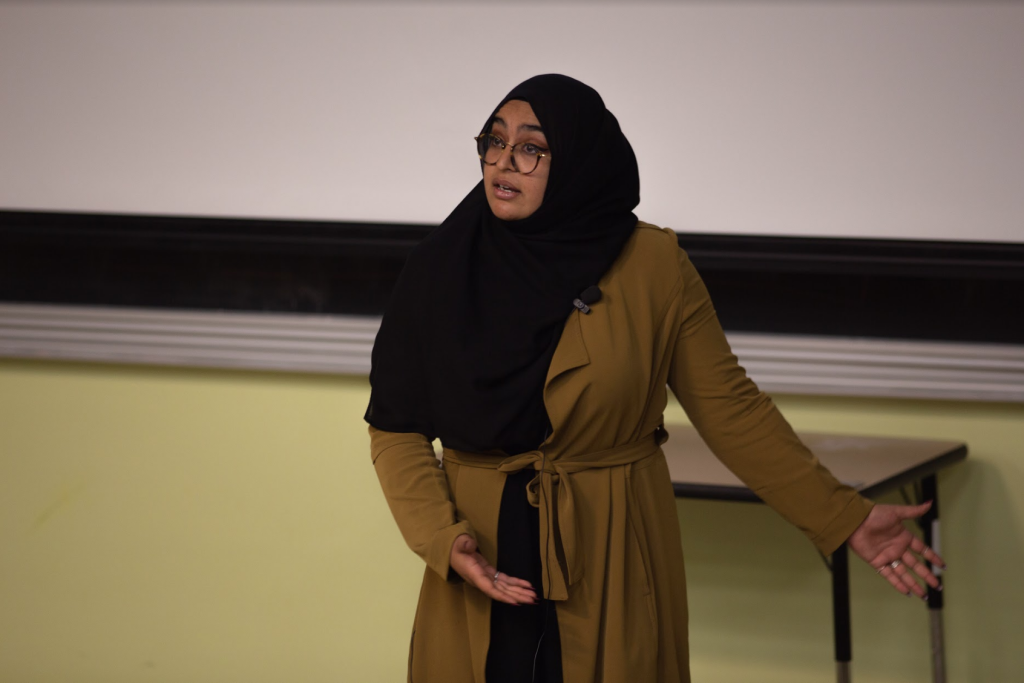A Dalhousie University student leader vowed to “not back down” after facing backlash for her criticism of Canada 150 celebrations last year, during a talk at the University of New Brunswick on Wednesday.
Masuma Khan, a vice-president on the student union, spoke at Tilley Hall about her experience standing with Indigenous peoples and taking issue with the celebrations of the anniversary of Confederate.
Before her UNB speech began, Khan emphasized those gathered were on Woolastook land that was never surrendered. A Woolastook elder was asked to chant.
“That’s calling our ancestors,” he said, before he chanted in each direction of the room.
A white woman approached the elder Woolastook man. Holding an infant in a baby carrier and a camcorder, the woman said: “We have a right to our country as well.”
She spoke in an aggressive tone and moved her camera inches away from the elder Woolastook man’s face. Once security arrived, the woman left by her own will, saying, “I just wanted to get that out there as I head out.”
“Unfortunately we have some people who resist,” Khan said.
Khan began her talk with a poem.
“It’s time for you to hear our thunder.”
“Laugh at me because I question the system we live under.”
“I’m painted as a terrorist, do you think that’s fun?”
“Do you know what it’s like on the other side of the gun?”
Khan is an Afghan and Muslim woman, whose grandparents immigrated to Canada. She was born and raised in Nova Scotia.
In 2016, she was elected as the vice-president academic and external and filed a motion requesting that the student union not partake in Canada 150 celebrations.
Khan said these celebrations were erasing thousands of years of history. When celebrating the colonization of Canada, 150 years ago, we are celebrating the deaths and destruction of the indigenous communities who occupied the land first, she said.
After filing the motion, Khan began receiving death threats via email, phone, letter and Twitter. A council member of the union told her that if she doesn’t like Canada she can leave, Khan said.
“It got hectic, to say the least,” she said.
She responded to the hate mail and threats with a facebook post saying “White fragility can kiss my ass,” using #whitetearsarentsacredthislandis.
Following the post, white supremacists began following her, taking photos of her and the hatred progressed. One man told her to “Crawl back into the s— hole you came out of.”

Khan said she deleted the post after being asked by the the school’s administration, and regrets the decision.
Dalhousie University called Khan in for a meeting claiming she had violated the student code of conduct.
“Where?” said Khan.
During this meeting they said Khan would have to give a full apology, with an explanation of how she misbehaved. Khan would also be required to take a course about dealing with racial issues appropriately. Conducted by a white man. Khan had no interest.
“A white man was supposed to teach me about my experience,” she said.
A lawyer heard of Khan’s story and decided to take her on as a pro-bono client. Dalhousie University eventually dropped the case.
Khan made the decision to go see a counselor on campus, as she was experiencing trauma. The white counselor attempted to empathize with Khan explaining that, she too, faced racism. Reverse racism, she claimed.
“I spent my hour session explaining how that can’t happen,” said Khan.
Khan is continuing her fight for solidarity and said, “I’m not afraid to die in this way.”
She has an activist kit with her at all times, containing wood sticks, a stapler, bristol board, markers and a omega phone. Khan said that building solidarity begins with making relationships and to “show-up.”
“You know what scares white supremacists? When two people they don’t like hold hands,” said Khan.
After her own union tried to have her impeached and students retaliated against Khan’s beliefs, she was re-elected as vice president academic and external at Dalhousie University. “I was shocked,” said Khan.
Khan said she will not back down until she tells her full truth. She hopes others will join her on her pursuit for solidarity, so they can find there’s as well.
“We often don’t realize we are suffering together,” she said.
The story was corrected at 1:53 p.m., September 24th.




